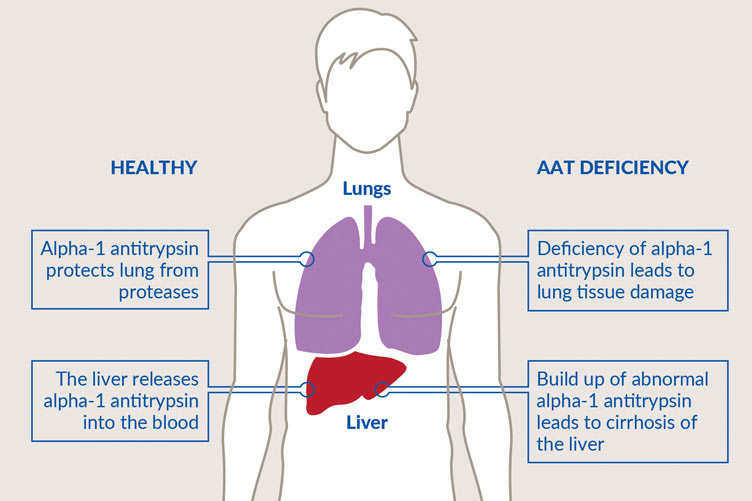A national detection programme run by RCSI at Beaumont Hospital has identified more than 500 people in Ireland with the severe form of the condition alpha-1 antitrypsin deficiency (AATD or alpha-1), enabling them to protect their lungs and liver into the future.
“Since the trial ended, I have been lucky enough to continue to receive the treatment up to the present day. It has made a huge difference to my life. I haven’t needed to go to hospital once. I feel like I am 45 again.”
– Rose, aged 65, who was diagnosed with alpha-1 thanks to the programme
Rose is one of more than 500 people diagnosed with severe AATD in Ireland, and each of them can now better protect their lungs and liver, which are affected by the inherited condition. A further 6,000 people have been diagnosed with moderate AATD, caused by either the SZ or MZ form of the condition.
“Alpha-1 is a genetic condition that can cause lung disease, liver disease and rarely skin disease,” explains Dr Tomás Carroll, who is Chief Scientist at Alpha-1 Foundation Ireland and a Senior Lecturer at RCSI.
“Alpha-1 antitrypsin deficiency means you have a deficiency in a really important protein we all produce, whose main job is to protect the lungs, it acts like a blanket or a shield for the lungs. And if you are deficient in this protective protein and you happen to smoke, you can rapidly develop serious lung disease. The most common lung problem people with alpha-1 can develop is called chronic obstructive pulmonary disease (COPD). Sometimes we see people with AATD really struggling in their late 30s or early 40s, and they have the lungs of a 70-year old smoker.”
Since 2004, RCSI University of Health Sciences and Beaumont Hospital have operated the National AATD Targeted Detection Programme, which is funded by the HSE. The aim is to identify people with AATD, and this targeted detection programme is the only national programme for AATD in the world.
“We have screened more than 26,000 people in Ireland for alpha-1 and we recently diagnosed our 500th person with the severe ZZ form of the condition,” says Professor Gerry McElvaney, Professor of Medicine at RCSI and lead clinician at the National Centre of Expertise for AATD at Beaumont Hospital.
Professor McElvaney notes the impact for the individual of receiving that diagnosis can be transformative.
“A diagnosis gives you the power to make lifestyle choices that protect your health,” he says.
“You can stop smoking or vaping, or never start these harmful habits, and avoid work environments where your lungs could be exposed to damaging gases or fumes. There’s so much you can control when you know what the risks are. Importantly, you can tell your own family members that they should consider getting checked too. The condition is genetic so we often see several members of the same family affected.
“Everyone with alpha-1 is offered the opportunity to attend the clinic at the National Centre of Expertise for AATD at Beaumont Hospital where they will receive state of the art care and be offered a variety of treatment options including participation in upcoming clinical trials. Many of the new clinical trials offer significant hope to people with alpha-1, and some of the new treatments aim to fix the underlying gene defect and cure the condition.”
Open the door for treatment
A small group of patients in Ireland – including Rose – have already benefited from a specific treatment for the lung disease caused by severe AATD which is called augmentation therapy. This involves weekly infusions of the alpha-1 antitrypsin (AAT) protein to boost their very low levels of AAT high enough to protect their lungs.
A recent study involving RCSI showed that augmentation therapy can slow rates of lung damage in people with severe AATD and offer a survival benefit.
And while AATD augmentation is not currently subsidised by the State, Professor McElvaney hopes that in the future it will be.
Exciting future for treatments
Other treatments are on the way too, underscoring the need to ensure as many people as possible are diagnosed.
“It's the most exciting time to work in AATD right now, because many companies are developing new drugs for severe AATD that use new techniques such as RNA editing, DNA editing or RNA interference,” says Dr Carroll.
Diagnosis is a relatively straightforward procedure – a GP can organise the initial blood test, then if appropriate, more detailed testing can be carried out at RCSI Beaumont Hospital, again through a blood test.
“It's a genetic condition, so if anyone has been diagnosed then their siblings should come forward for testing. We should also be testing newborns for the condition so babies born with the condition can benefit from that knowledge as early as possible,” says Dr Carroll. “If alpha-1 was tested for at birth, we would have a lot more people diagnosed, and getting the best care and treatment.”
RCSI is committed to achieving a better and more sustainable future through the UN Sustainable Development Goals.
![]()


